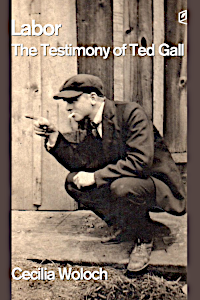|
|
|
|
Labor: The Testimony of Ted Gall
Cecilia Woloch

 Accents Publishing is proud to bring to you a new chapbook by acclaimed poet Cecilia Woloch, LABOR: The Testimony of Ted Gall. An extended poem in linked sections, in the voice of coal miner and activist Ted Gall, LABOR weaves one man's personal history into the history of work and justice in America.
Accents Publishing is proud to bring to you a new chapbook by acclaimed poet Cecilia Woloch, LABOR: The Testimony of Ted Gall. An extended poem in linked sections, in the voice of coal miner and activist Ted Gall, LABOR weaves one man's personal history into the history of work and justice in America.

What Others Say About LABOR

In Labor, Woloch pulls a voice from the archives—that of Ted Gall, a miner and union organizer in Western Pennsylvania during the first half of the twentieth century. This poem, composed almost entirely in words written by Gall himself, gives a first-hand account of what it was like in the mines, in the unions, and in the spirits of the working poor, "lifting their voices like trumpets" to sound what is somehow both historical and timely. This is an important contribution to Appalachian docupoetics and cross-racial labor solidarity. Woloch is a rescuer of language, a poet who knows where to dig up truths.

—Joy Priest

Profit, exorbitant profit, promises corruption. This poetic meditation, at once a documentary and a monologue, tracks the surprising confluence of miners' unions and the Harlem Renaissance. By the end of this eloquent and plain-spoken chapbook, such a connection seems inevitable. Our best art springs from the foundational belief that the beauty of art blooms from the struggle for justice.

—Maurice Manning

Ted Gall's voice calls out to us from past eras, when the robber barons of the 19th Century had given way to faceless corporations whose rapacity and strongarm thugs, like the Coal and Iron Police, gave rise to the IWO and unions like the one that Gall, a true working-class hero, helped organize. These poems weave another bright human thread into the fabric of labor's history. Do yourself a favor and check them out, particularly in light of today's divisive unrest.

—Joseph Millar

|
| |

I. Mining (1918–1920s)
You had to load 20 ton out of there.

That was for your shift.
Then you had at least 5 ton of stuff
that you threw away
that was no good
and maybe about 10 ton that you got paid for
if you were lucky.

Then your 30 cents a ton made you $3.80 per day
and then you had to pay for rent on your lamp
and buy your powder.

Of course, you had a lot of work that was called dead-work
that you gave to them—
putting up support poles, dynamiting, etc….
That was for free. You only got paid
for the tonnage that crossed the scales.
Then you usually had guys down there
that would cheat on the scales.

You were lucky if you ended up with a dollar a day.

|
Details and Ordering

Publication Date: November 11, 2024
Format: Softcover, 6" x 9"
ISBN: 978-1-961127-12-8
Price: $17.00


About the Author

Cecilia Woloch comes from a long line of fortune tellers and labor activists. She was born in Pittsburgh, Pennsylvania, and grew up there and in rural Kentucky, one of seven children of a homemaker and an airplane mechanic. She is the recipient of fellowships from the National Endowment for the Arts and the Fulbright Foundation, and the author of six previous collections of poems: Sacrifice, a Book Sense 76 Selection in 2001; Tsigan: The Gypsy Poem, which has been given multi-disciplinary presentations across the U.S. and Europe; Late, for which she was named Georgia Author of the Year in Poetry in 2004; Narcissus, winner of the Tupelo Press Snowbound Prize in 2006; Carpathia, a finalist for the Milton Kessler Award in 2010; Earth, winner of the 2015 Two Sylvias Press chapbook prize, and Sur la Route (On the Road) a novel-in-vignettes. She collaborates regularly with musicians, dancers, visual artists and theatre artists. Her writing has been translated and published in French, German, Polish, Romanian, Bulgarian, Hungarian, Ukrainian, Hebrew, and Romanes.
|

|

|
|
|
|
|
|
|
|